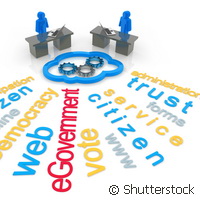eGovernment in Germany
Despite technological advances, queuing up to fill out forms and sort out paperwork for ID cards and other administrative issues is not quite a thing of the past. Many European citizens still spend hours having to do this sort of thing. This is why the concept of eGovernment is so important, for it promises to create efficiencies and significantly free up people's time. eGovernment involves more than just implementing certain ICT tools. Effective eGovernment is about rethinking organisations and processes and changing behaviour so that public services are delivered more efficiently to the people who need them. Implemented well, eGovernment can enable citizens, enterprises and organisations to carry out their business with government easier, quicker and at a lower cost. Electronic communication has long been an everyday reality in German public sector offices. However, case workers often only use modern document management systems for recording digitized files, while continuing with their old systems of working. In Denmark by contrast, seven government ministries have undergone a full digital changeover. Drawing on the success of the Danes, the Fraunhofer Institute for Open Communication Systems (FOKUS) is looking into how Danish ICT solutions could be swiftly adapted for German government agencies. "We have been investigating interoperable and cost-effective ICT solutions for German government agencies since way back in 2004," explains Dr Michael Tschichholz from FOKUS. "One of our partners is cBrain, whose integrated solution is already being very successfully implemented in seven Danish government ministries. We took a close look at the technology and discovered that it would suit the needs of German government agencies very well." The German government set out its recommendations for such an ICT platform in its "Organizational Concept for Electronic Administration". Alongside electronic records management, the recommendations specify that the platform should be capable of modelling electronic workflows and electronic collaboration, and integrating the various software applications for specialist processes that have grown up over the years. "These building blocks of eGovernment are supported by the Danish solution. As an option, managers can also be included in digital processes via mobile devices," says Tschichholz. In Denmark, the Ministries of Social Affairs and Integration, of Transport, of Climate, Energy and Building, of the Environment, of Employment, of Housing, Urban and Rural Affairs and the Prime Minister's Office have already fully digitized their records management, administration work and casework. All written material - whether formal or informal - is managed in a standardised ICT environment. The core component is integrated knowledge management. Employees have immediate access to relevant information via a digital archive. Social media technologies such as chat forums are integrated into formal work processes and support informal communication. "Users' experiences have been positive across the board," reports Tschichholz. "At the Ministry of Social Affairs and Integration, every employee saves 30 to 45 minutes a day. 81 per cent of employees at the Ministry of Transport are either satisfied or very satisfied. The most recent changeovers took only a few weeks in each case. "Meanwhile, the time needed for training is kept within reasonable limits, as employees have recourse to user interfaces they are familiar with and receive individual support from 'runners' who move from office to office during the brief introduction phase." Tschichholz and his team have developed specific application scenarios, and these are currently undergoing a field test in German ministries. In the FOKUS eGovernment Laboratory, research scientists recreated sample workflows from the Federal Ministry of the Interior and analysed how the Danish solution could be adapted to the ministry's work. "We showed, for example, how the solution can be used to draft briefing documents, which the permanent secretary or minister can then conveniently access on the move from a tablet PC," says Tschichholz, who also uses the ICT platform at FOKUS for internal processes. Last year, the team successfully presented the laboratory scenario to Cornelia Rogall-Grothe, Federal Government Commissioner for Information Technology, and the Danish Ambassador Per Poulsen-Hansen. At the CeBIT trade show, FOKUS will demonstrate how mobile devices can be securely used for administration work with the aid of the Danish ICT platform. The European Commission is supporting initiatives such as this through its eGovernment Action Plan 2011-2015, which aims to provide a new generation of eGovernment services to benefit both businesses and citizens. While public administrations across Europe are making the leap from government to eGovernment, citizens will only reap the rewards of more online services if they are efficient, accessible and easy to use. Achieving this will be one of the main challenges that researchers such as those in Germany will have to overcome.For more information, please visit: Fraunhofer eGovernment Centerhttp://www.fraunhofer.de/en/press/research-news/2013/february/awakening-the-dormant-potential-of-e-government.html
Countries
Germany



